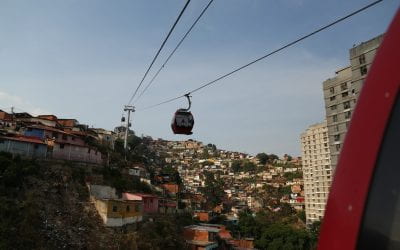Editor’s Letter
Not a Matter of Statistics
Displacement is mean, I found out through my long experience with and in Latin America. As a teenager, I lived in a Dominican neighborhood on New York’s Upper West Side. My neighbors were professionals in their homeland, but they were working as janitors and factory workers. They had fled the Trujillo dictatorship to start a new life in the United States. We exchanged English and Spanish lessons, and I got the better end of the deal because they were exhausted after their unaccustomed days of manual labor and switched to Spanish after the “obligatory” hour of practice.
Throughout my professional life as a journalist, I constantly encountered displaced people: Cubans in Union City, New Jersey, who taught me the word “luto” (mourning) as they expressed how they felt about their homeland; Chileans in Panamá eeing from the Pinochet regime and crafting images of Mapuche women in copper (one of which still hangs in my Somerville kitchen); Salvadorans, Nicaraguans, Guatemalans escaping wars and repression. And then there was the little girl named Marilyn from Colombia’s Pacific Coast, who attracted me with her friendly, curious gaze, in my Bogotá neighborhood. Her father was trying to find his way through the bureaucracy to enroll his daughter in a public school. Marilyn didn’t like Bogotá. It was cold and you couldn’t go fishing. Displacement is mean.
“Displacement” is the thematic emphasis this year for the David Rockefeller Center for Latin American Studies, and the reason we are doing this particular issue now. We decided to add an “s” to “displacement” because not all displacement is political. Although much of this issue focuses on the thousands of people in Colombia, Central and Mexico, displaced because of political and gang violence, displacement comes about from environmental abuses, land grabs, mining and energy projects, sexual orientation, domestic violence. The list of reasons for displacement goes on and on, and for reasons of space, we could only touch on some of these themes.
But the common thread of all these displacements is the incredible resilience of the men, women and children who are forced from home. They learn to forge their way in new communities in their homelands and beyond. They learn new languages and new trades. Some of them, like the displaced Chileans in Panamá, will learn to communicate their plight and longing through their homeland through the plastic arts. Others, like Florika of my elementary school days, will express themselves through music.
The numbers of displaced people worldwide are horrific—65.3 million people worldwide in 2015, according to the UN Refugee Agency—what Florika taught me with the strains of her violin is that displacement is not just a matter of statistics.
Winter 2017, Volume XVI, Number 2
Related Articles
Editor’s Letter – Animals
Editor's LetterANIMALS! From the rainforests of Brazil to the crowded streets of Mexico City, animals are integral to life in Latin America and the Caribbean. During the height of the Covid-19 pandemic lockdowns, people throughout the region turned to pets for...
Editor’s Letter – Museums
Editor's LetterMuseums. They are the destination of school field trips, a place to explore your own culture and a great place to run around and explore. They are exciting or boring, a collection of objects or a powerful glimpse into other worlds. Until recently—with...
Editor’s Letter: Transportation
Bridges. Highways. Tunnels. Buses. Trains. Subways. Transmilenio. Transcable. When I first started working on this issue of ReVista on Transportation (Volume XXI, No. I), I imagined transportation as infrastructure.


